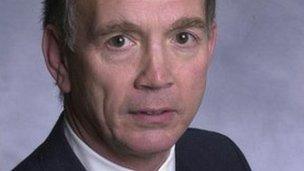The price of defection
- Published
- comments
When a pundit as well connected as Conservative Home's Tim Montgomerie writes in the Times that two Tory MPs are seriously contemplating switching their allegiance to UKIP, the world takes his words pretty seriously. One blogger even published a list of potential defectors.
It is certainly true that a lot of Conservative MPs are deeply unhappy with the coalition's euro-policies; and it is not hard to imagine them considering taking the plunge.

Bob Spink sat out his term as an independent MP
But actually diving in is another matter. In the last parliament Bob Spink - then MP for Castle Point in Essex - seemed to switch to UKIP, but later insisted he'd never actually joined. He sat out his term as an independent and lost to the Conservative Rebecca Harris, external in 2010.
There has been a dribble of cross-party defections over recent years - but few of the defectors defended the seat they held under their new colours at the next election, still less stood down and called a by-election. The last time there was any kind of mass breakaway was the formation of the SDP in the early 1980s, when a tenth of Labour MPs switched to the newly-formed party. Almost all of them subsequently lost their seats.
Then the driving force was ideological schism, plus the prospect of deselection by left-wing activists - and the political opportunity they saw for a centre-ground party as British politics became increasingly polarised. There were also a lot of unhappy Conservatives who didn't like Mrs Thatcher's leadership - but only one of their MPs, Christopher Brocklebank-Fowler, actually jumped. (There's a very funny story to the effect that one current Conservative minister went to a few SDP meetings in the early 1980s and reported back to his wife: "Darling, they're so sensible, so thoughtful, so moderate." "Yes dear," his spouse is said to have retorted, "that's why they'll lose.")
My point is that tribal loyalty in the Conservatives is incredibly strong. You have to go back to the mid-19th Century to find a major breakaway. The ties of career and ambition, and the ingrained instinct to fight your corner inside the tribe, make the idea of defecting to another organisation all but unthinkable. One Conservative MP told me his pitch to would-be defectors to UKIP from his constituency party was to tell them they were weakening his hand against Ken Clarke.
However, the other factor to watch is the shake-up in Commons seats. With 50 constituencies due to disappear, there could be some MPs left standing when the music stops - and they'd have nothing to lose, career-wise, by jumping ship.
For Tory eurosceptics, chafing under the coalition, and increasingly convinced that David Cameron is not serious on Europe, the siren call of UKIP as an unabashedly "get out of the EU now" party clearly resonates.
Perhaps some young, ambitious and marginalised backbencher might see an opportunity to carve themselves an influential place in an emerging force in British politics - with maybe the consolation prize of a place on UKIP's list for the next Euro-elections if things don't work out.
But the real game-changing possibility of a substantial breakaway from the Tories - 10 plus MPs, including some ex-Cabinet heavyweights, looks remote at the moment.
And from UKIP's side of the equation, the arrival of political refugees from the Tory benches might not be an unmixed blessing. Any MP who took up the UKIP banner, and was prepared to be energetic about it, would be, de facto, the face of the party, popping up to speak for UKIP at PMQs (and look how the Speaker allowed George Galloway an instant moment in the sun at PMQs this week) or big debates.
Well and good...unless the person concerned makes up their policy as they go along...and the UKIP hierarchy find they have no control over "their" MP. The arrival of a contingent of defectors headed by some ex-Cabinet heavyweight could easily amount to a takeover, with the Westminster professionals side-lining the party faithful. Defection can be a complicated business at the receiving end as well as the split end.